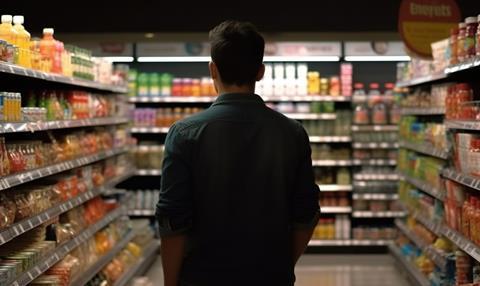Kantar has released the latest data regarding the grocery market and consumer spending habits, revealing that grocery price inflation fell in January while own-brand plant-based sales dropped.

Kantar reported that the fastest growing grocer in Britain for the fifth month in a row was Lidl, as it was also the only retailer to see double-digit growth in the latest 12 weeks. Spending at the discounter was up 11.9%, to bring its market share to 7.5%. Aldi also reportedly grew ahead of the market, with sales up by 7.2% and its share increasing by 0.1% to 9.3%.
Sainsbury's and Tesco gained market shares over the 12 weeks to 21st January 2024, with Sainsbury's increasing its sales by 8.1% to take 15.7% of the market. This was up 0.3% from 2023, while Tesco sales grew by 6.3% to hold a market share of 27.6%, up from 27.5%.
Morrisons sales increased by 2.8%, with the grocer holding an 8.8% share. Asda's share was 13.7%, with sales increasing by 2.1% compared to a year ago.
Co-op accounted for 5.3% of the market, growing sales by 1.8%, while Waitrose increased its sales by 3.5% to hold 4.6% of the market.
Online sales rose by 6.3% in the last 12 weeks, slightly ahead of Ocado's growth where spending was 4% higher than last year. The online-only retailer reportedly had a 1.7% share of the total market.
Fraser McKevitt, head of retail and consumer insight at Kantar, said: "All eyes are back on inflation again, after the Consumer Price Index's (CPI) unexpected jump earlier in the month. There's been a lot of speculation about the impact the Red Sea shipping crisis might have on the cost of goods, but the story in the grocery aisles this January is more about the battle between the supermarkets to offer best value, rather than geopolitics.
"Retailers have taken their foot off the promotions gas slightly as we've come into the new year, and that's meant inflation hasn't fallen as quickly.
"Items bought on offer accounted for 27% of all grocery spending in January versus 32% last month. Christmas is always a bumper period for deals and the grocers pulled the price lever especially hard in December, as they sought to get shoppers through their doors.
"However, there's still plenty of opportunities for consumers to make savings. The overall trend in offers is up versus this time last year, and nearly £500 million more was spent on offers this January than in the same month in 2023."
He said: "There's evidence to suggest that people are opting for more homemade meals to keep budgets in line."
The data showed that 86 million more lunchboxes were taken out of the home in 2023, demonstrating a rise in meals prepared at home.
"Looking ahead to February, it will be interesting to see how this plays out on Valentine's Day, and if couples will opt for more low-key celebrations. This was certainly the case in 2023, when we saw a massive £43 million spent on supermarket meal deals costing £10 or more in the week before the special day."
Own label plant-based sales dropped
Sales of own-brand plant-based ranges increased by 8% on the month, as 'Veganuary' began at the start of 2024. However, this marked a decline in sales compared to that recorded in January 2020.
McKevitt said: "Health always comes to the fore as a priority for consumers in January, but what's interesting this month is that we're not seeing as big a spike in health-related categories as we have done in previous years.
"That's because people are now buying more of the typical January 'health kick' items throughout the year. 9% of annual own label plant-based sales were made in January in 2023, a steady decline compared with the 11% of sales in 2020."
This story was originally published on a previous version of the Meat Management website and so there may be some missing images and formatting issues.















